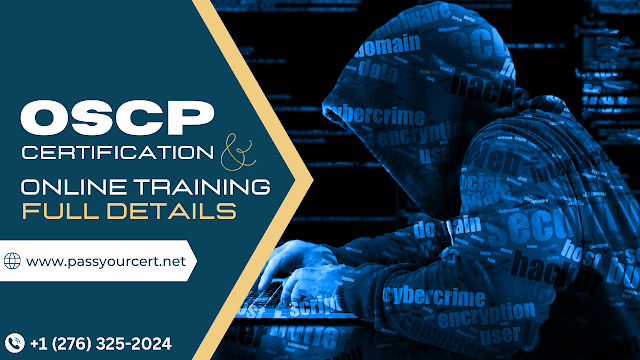Comprehensive Guide to OSCP Certification and Online Training Course
The Offensive Security Certified Professional, OSCP Certificate is recognized as a benchmark for demonstrating practical skills in penetration testing and ethical hacking. It is a rigorous certification that requires not only a theoretical understanding but also hands-on proficiency in various hacking methodologies. This guide delves deeply into the OSCP course structure, exam format, prerequisites, and tips to master the certification, offering you a complete resource to dominate your learning path.
Introduction to OSCP Certification
The OSCP Certification is designed to teach and evaluate penetration testing skills through hands-on experiences. Developed by Offensive Security, it uses a practical approach to cover methodologies, tools, and techniques, making it one of the most challenging yet rewarding certifications for cybersecurity professionals.
The certification is particularly valuable for security analysts, ethical hackers, and penetration testers aiming to solidify their skill set. It emphasizes the "Try Harder" mentality, pushing candidates to continuously hone their abilities until they can successfully exploit complex systems.
Why Pursue the OSCP?
The OSCP certification is not for the faint of heart. It requires candidates to master various topics, including:
- Network penetration testing: Scanning and enumeration of networks.
- Vulnerability identification and exploitation.
- Privilege escalation: Gaining root or administrator-level access.
- Custom exploit development.
Key Advantages:
- Hands-On Learning: Unlike other certifications, the OSCP is purely hands-on, focusing on practical problem-solving.
- Recognized Industry Standard: The OSCP is highly regarded in the industry, making it a solid credential for job seekers.
- Comprehensive Syllabus: Covers everything from scripting to active directory attacks, preparing you for real-world challenges.
Course Prerequisites
Before embarking on the OSCP journey, it’s crucial to have foundational knowledge in the following areas:
- Networking Fundamentals: Familiarity with TCP/IP, subnetting, and packet analysis.
- Operating Systems: Strong grasp of both Linux and Windows systems.
- Scripting Languages: Experience with Bash scripting and basic knowledge of Python or Perl.
- Basic Security Concepts: An understanding of standard penetration testing techniques and tools.
Candidates are recommended to have a minimum of 1-2 years of experience in information security or related fields. However, beginners with dedication and a strong interest in penetration testing can also succeed with adequate preparation.
OSCP Curriculum Overview
The OSCP curriculum is extensive, encompassing various critical aspects of penetration testing. The course is based on the Penetration Testing with Kali Linux (PwK) material, which offers a self-paced, hands-on learning environment. Below is a breakdown of the primary curriculum topics:
OSCP Course Modules
- Introduction to Penetration Testing:
- Overview of penetration testing methodologies.
- Setting up the lab environment.
- Getting Familiar with Kali Linux:
- Command-line basics and essential Linux tools.
- File management, scripting, and package installations.
- Information Gathering:
- Passive and active information gathering.
- Enumeration techniques for identifying open ports, services, and vulnerabilities.
- Exploitation and Gaining Access:
- Identifying and exploiting vulnerabilities.
- Buffer overflow exploitation.
- Web application attacks (SQL Injection, Cross-Site Scripting).
- Privilege Escalation:
- Windows and Linux privilege escalation.
- Techniques for bypassing UAC and other security controls.
- Client-Side Attacks:
- Exploiting client applications.
- Social engineering vectors.
- Advanced Exploitation:
- Custom exploit development.
- Writing Metasploit modules.
- Post-Exploitation:
- File transfers and remote command execution.
- Persistence techniques.
- Reporting and Documentation:
- Writing professional penetration testing reports.
OSCP Exam Structure and Requirements
The OSCP exam is a 24-hour challenge that tests your ability to penetrate multiple systems and document your process. To successfully pass the exam, candidates must:
- Compromise Multiple Machines: Demonstrate skill in exploiting at least 3 out of 5 target systems.
- Document Findings: Create a comprehensive report detailing how each system was compromised, including all steps and exploit codes used.
- Achieve a Minimum Score: The passing score is set at 70 out of 100 points.
Exam Format:
- Number of Targets: Typically 5 machines.
- Duration: 24 hours for the exam + 24 hours for documentation.
- Question Type: Entirely hands-on, no multiple-choice questions.
- Proctoring: Online proctoring with strict exam conditions.
Recommended Learning Resources
To maximize your success in the OSCP exam, consider using the following resources:
- Official OSCP Course Material: The PwK (Penetration Testing with Kali) course is the primary source.
- Offensive Security Labs: Practice in the labs provided by Offensive Security.
- Books:
- "The Web Application Hacker's Handbook" by Dafydd Stuttard.
- "Metasploit: The Penetration Tester’s Guide" by David Kennedy.
- Online Communities: Engage in forums such as Reddit’s r/oscp and NetSecFocus for insights and tips.
Career Benefits of OSCP Certification
Achieving the OSCP certification opens several doors in the cybersecurity industry:
- Increased Earning Potential: Certified professionals often command higher salaries.
- Expanded Job Opportunities: The OSCP is highly regarded for positions such as penetration tester, security analyst, and ethical hacker.
- Enhanced Skill Set: The certification demonstrates both theoretical and practical expertise, making it a comprehensive credential.
Tips to Succeed in the OSCP Exam
- Practice Regularly: Spend ample time in the lab environment to simulate real-world scenarios.
- Master Buffer Overflows: Understanding buffer overflow exploitation is crucial for gaining initial access.
- Document Every Step: Proper documentation not only helps during the exam but is also a core requirement for passing.
- Manage Your Time Effectively: Allocate time wisely during the exam, focusing on high-value targets first.
Conclusion
The OSCP Certificate is a challenging yet immensely rewarding credential that sets professionals apart in the field of penetration testing. With rigorous preparation, hands-on experience, and the right resources, you can master the OSCP exam and enhance your career prospects significantly. Commit to continuous learning and adopt the "Try Harder" philosophy to ensure success in this challenging endeavor.


%20656-0395%20(3).png)

Comments
Post a Comment